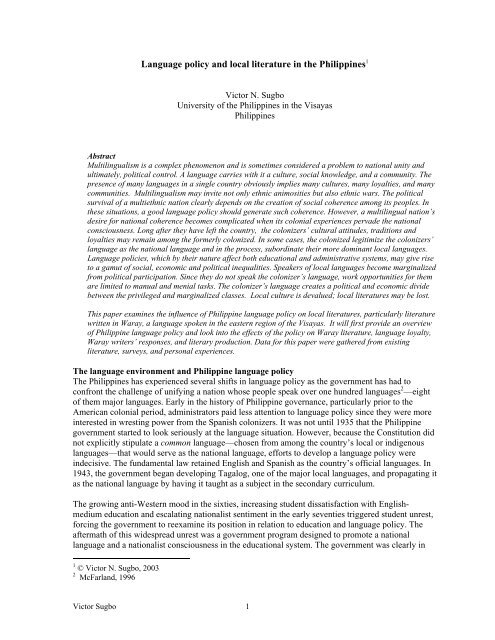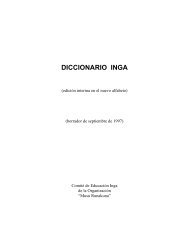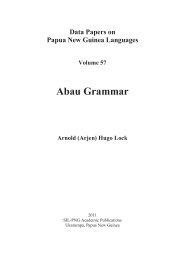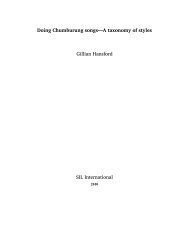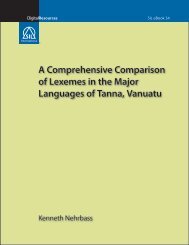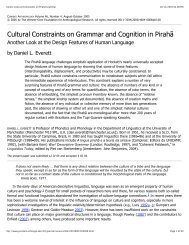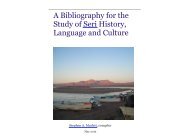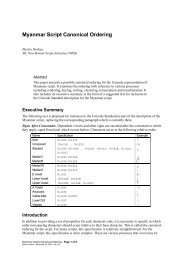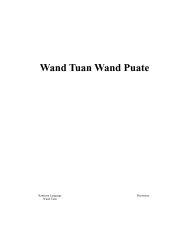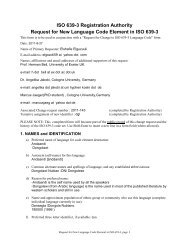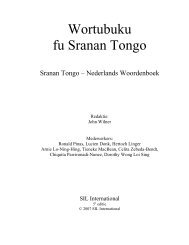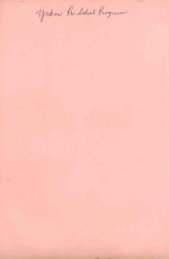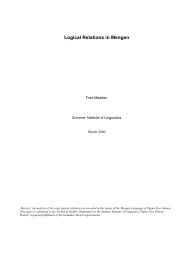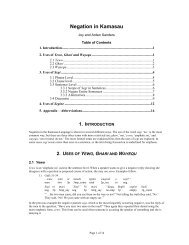Language policy and local literature in the ... - SIL International
Language policy and local literature in the ... - SIL International
Language policy and local literature in the ... - SIL International
You also want an ePaper? Increase the reach of your titles
YUMPU automatically turns print PDFs into web optimized ePapers that Google loves.
<strong>Language</strong> <strong>policy</strong> <strong>and</strong> <strong>local</strong> <strong>literature</strong> <strong>in</strong> <strong>the</strong> Philipp<strong>in</strong>es 1<br />
Victor Sugbo 1<br />
Victor N. Sugbo<br />
University of <strong>the</strong> Philipp<strong>in</strong>es <strong>in</strong> <strong>the</strong> Visayas<br />
Philipp<strong>in</strong>es<br />
Abstract<br />
Multil<strong>in</strong>gualism is a complex phenomenon <strong>and</strong> is sometimes considered a problem to national unity <strong>and</strong><br />
ultimately, political control. A language carries with it a culture, social knowledge, <strong>and</strong> a community. The<br />
presence of many languages <strong>in</strong> a s<strong>in</strong>gle country obviously implies many cultures, many loyalties, <strong>and</strong> many<br />
communities. Multil<strong>in</strong>gualism may <strong>in</strong>vite not only ethnic animosities but also ethnic wars. The political<br />
survival of a multiethnic nation clearly depends on <strong>the</strong> creation of social coherence among its peoples. In<br />
<strong>the</strong>se situations, a good language <strong>policy</strong> should generate such coherence. However, a multil<strong>in</strong>gual nation’s<br />
desire for national coherence becomes complicated when its colonial experiences pervade <strong>the</strong> national<br />
consciousness. Long after <strong>the</strong>y have left <strong>the</strong> country, <strong>the</strong> colonizers’ cultural attitudes, traditions <strong>and</strong><br />
loyalties may rema<strong>in</strong> among <strong>the</strong> formerly colonized. In some cases, <strong>the</strong> colonized legitimize <strong>the</strong> colonizers’<br />
language as <strong>the</strong> national language <strong>and</strong> <strong>in</strong> <strong>the</strong> process, subord<strong>in</strong>ate <strong>the</strong>ir more dom<strong>in</strong>ant <strong>local</strong> languages.<br />
<strong>Language</strong> policies, which by <strong>the</strong>ir nature affect both educational <strong>and</strong> adm<strong>in</strong>istrative systems, may give rise<br />
to a gamut of social, economic <strong>and</strong> political <strong>in</strong>equalities. Speakers of <strong>local</strong> languages become marg<strong>in</strong>alized<br />
from political participation. S<strong>in</strong>ce <strong>the</strong>y do not speak <strong>the</strong> colonizer’s language, work opportunities for <strong>the</strong>m<br />
are limited to manual <strong>and</strong> menial tasks. The colonizer’s language creates a political <strong>and</strong> economic divide<br />
between <strong>the</strong> privileged <strong>and</strong> marg<strong>in</strong>alized classes. Local culture is devalued; <strong>local</strong> <strong>literature</strong>s may be lost.<br />
This paper exam<strong>in</strong>es <strong>the</strong> <strong>in</strong>fluence of Philipp<strong>in</strong>e language <strong>policy</strong> on <strong>local</strong> <strong>literature</strong>s, particularly <strong>literature</strong><br />
written <strong>in</strong> Waray, a language spoken <strong>in</strong> <strong>the</strong> eastern region of <strong>the</strong> Visayas. It will first provide an overview<br />
of Philipp<strong>in</strong>e language <strong>policy</strong> <strong>and</strong> look <strong>in</strong>to <strong>the</strong> effects of <strong>the</strong> <strong>policy</strong> on Waray <strong>literature</strong>, language loyalty,<br />
Waray writers’ responses, <strong>and</strong> literary production. Data for this paper were ga<strong>the</strong>red from exist<strong>in</strong>g<br />
<strong>literature</strong>, surveys, <strong>and</strong> personal experiences.<br />
The language environment <strong>and</strong> Philipp<strong>in</strong>e language <strong>policy</strong><br />
The Philipp<strong>in</strong>es has experienced several shifts <strong>in</strong> language <strong>policy</strong> as <strong>the</strong> government has had to<br />
confront <strong>the</strong> challenge of unify<strong>in</strong>g a nation whose people speak over one hundred languages 2 —eight<br />
of <strong>the</strong>m major languages. Early <strong>in</strong> <strong>the</strong> history of Philipp<strong>in</strong>e governance, particularly prior to <strong>the</strong><br />
American colonial period, adm<strong>in</strong>istrators paid less attention to language <strong>policy</strong> s<strong>in</strong>ce <strong>the</strong>y were more<br />
<strong>in</strong>terested <strong>in</strong> wrest<strong>in</strong>g power from <strong>the</strong> Spanish colonizers. It was not until 1935 that <strong>the</strong> Philipp<strong>in</strong>e<br />
government started to look seriously at <strong>the</strong> language situation. However, because <strong>the</strong> Constitution did<br />
not explicitly stipulate a common language—chosen from among <strong>the</strong> country’s <strong>local</strong> or <strong>in</strong>digenous<br />
languages—that would serve as <strong>the</strong> national language, efforts to develop a language <strong>policy</strong> were<br />
<strong>in</strong>decisive. The fundamental law reta<strong>in</strong>ed English <strong>and</strong> Spanish as <strong>the</strong> country’s official languages. In<br />
1943, <strong>the</strong> government began develop<strong>in</strong>g Tagalog, one of <strong>the</strong> major <strong>local</strong> languages, <strong>and</strong> propagat<strong>in</strong>g it<br />
as <strong>the</strong> national language by hav<strong>in</strong>g it taught as a subject <strong>in</strong> <strong>the</strong> secondary curriculum.<br />
The grow<strong>in</strong>g anti-Western mood <strong>in</strong> <strong>the</strong> sixties, <strong>in</strong>creas<strong>in</strong>g student dissatisfaction with Englishmedium<br />
education <strong>and</strong> escalat<strong>in</strong>g nationalist sentiment <strong>in</strong> <strong>the</strong> early seventies triggered student unrest,<br />
forc<strong>in</strong>g <strong>the</strong> government to reexam<strong>in</strong>e its position <strong>in</strong> relation to education <strong>and</strong> language <strong>policy</strong>. The<br />
aftermath of this widespread unrest was a government program designed to promote a national<br />
language <strong>and</strong> a nationalist consciousness <strong>in</strong> <strong>the</strong> educational system. The government was clearly <strong>in</strong><br />
1 © Victor N. Sugbo, 2003<br />
2 McFarl<strong>and</strong>, 1996
need of a cultural project that would unite <strong>the</strong> nation. In 1972, <strong>the</strong> imposition of Martial Law<br />
generated public fear, silenc<strong>in</strong>g <strong>the</strong> more restive areas <strong>in</strong> <strong>the</strong> country <strong>and</strong> <strong>in</strong> <strong>the</strong> year that followed,<br />
Pres. Ferd<strong>in</strong><strong>and</strong> Marcos called for <strong>the</strong> ratification of a constitution that would confer on him<br />
enormous political power. One provision of that constitution was <strong>the</strong> adoption of a national language<br />
called Filip<strong>in</strong>o. The Filip<strong>in</strong>o language was envisioned as a universal language that would grow out of<br />
<strong>the</strong> mix of several Philipp<strong>in</strong>e languages. S<strong>in</strong>ce <strong>the</strong> general perception was that <strong>the</strong> national language<br />
did not yet exist, <strong>the</strong> government declared English <strong>and</strong> Filip<strong>in</strong>o—actually Tagalog—<strong>the</strong> official <strong>and</strong><br />
de facto national languages.<br />
It was easy to make changes <strong>in</strong> <strong>the</strong> educational system under Martial Law. All it took was a<br />
presidential decree or an executive order. In 1974, an order from <strong>the</strong> Department of Education,<br />
Culture <strong>and</strong> Sports was issued to set a bil<strong>in</strong>gual education scheme <strong>in</strong> place. Informed by f<strong>in</strong>d<strong>in</strong>gs from<br />
a language survey, <strong>the</strong> <strong>policy</strong> was received with mixed feel<strong>in</strong>gs by teachers <strong>and</strong> students from <strong>the</strong><br />
different regions of <strong>the</strong> country. The department order m<strong>and</strong>ated that English would be <strong>the</strong> medium of<br />
<strong>in</strong>struction <strong>in</strong> science <strong>and</strong> ma<strong>the</strong>matics <strong>and</strong> that Filip<strong>in</strong>o or Tagalog would be <strong>the</strong> medium of<br />
<strong>in</strong>struction <strong>in</strong> all o<strong>the</strong>r subjects <strong>in</strong> elementary <strong>and</strong> secondary levels. Never<strong>the</strong>less, <strong>the</strong> bil<strong>in</strong>gual<br />
education scheme flourished <strong>and</strong> became <strong>in</strong>strumental <strong>in</strong> perpetuat<strong>in</strong>g <strong>and</strong> circulat<strong>in</strong>g <strong>the</strong> myths <strong>and</strong><br />
legends about Marcos’ leadership.<br />
The EDSA Revolution <strong>in</strong> 1986 ended <strong>the</strong> Marcos regime <strong>and</strong> catapulted <strong>in</strong>to power <strong>the</strong> first woman<br />
president, Corazon Aqu<strong>in</strong>o, who restored democratic <strong>in</strong>stitutions through a new constitution.. In no<br />
uncerta<strong>in</strong> terms, <strong>the</strong> constitution declared Filip<strong>in</strong>o (Tagalog) as <strong>the</strong> national language <strong>and</strong> reiterated<br />
<strong>the</strong> position of English as an official language of <strong>the</strong> country. As before, both were to serve as<br />
languages of <strong>in</strong>struction. Today this <strong>policy</strong> has succeeded not only <strong>in</strong> generat<strong>in</strong>g widespread use of<br />
Filip<strong>in</strong>o (Tagalog) as <strong>the</strong> medium of communication among citizens speak<strong>in</strong>g different languages, but<br />
also <strong>in</strong> ma<strong>in</strong>ta<strong>in</strong><strong>in</strong>g English as <strong>the</strong> medium of communication <strong>in</strong> government <strong>and</strong> bus<strong>in</strong>ess.<br />
Writ<strong>in</strong>g <strong>local</strong> <strong>literature</strong>: <strong>Language</strong> loyalty <strong>and</strong> <strong>the</strong> Waray writer<br />
Literature written <strong>in</strong> Waray is essentially poetry <strong>and</strong> drama. Its development took two directions.<br />
Poetry flourished with <strong>the</strong> publication of <strong>local</strong> newspapers while drama grew with <strong>the</strong> celebration of<br />
town fiestas. The drama was usually written by a <strong>local</strong> playwright upon <strong>the</strong> request of <strong>the</strong> hermano or<br />
mayor <strong>and</strong> was presented on <strong>the</strong> feast day.<br />
In <strong>the</strong> early 1900s, <strong>the</strong> Philipp<strong>in</strong>es was undergo<strong>in</strong>g a political transition, a shift <strong>in</strong> power after Spa<strong>in</strong><br />
ceded <strong>the</strong> country to America. Although <strong>the</strong> Spanish colonizers were already gone, <strong>local</strong> newspapers<br />
still carried Spanish names like La Voz de Leyte, El Heraldo de Leyte, Noli Me Tangere, El Liberal,<br />
<strong>and</strong> El Obrero <strong>and</strong> were written mostly <strong>in</strong> Spanish. While <strong>the</strong> colonial Philipp<strong>in</strong>e government favored<br />
<strong>the</strong> use of English <strong>and</strong> Spanish as <strong>the</strong> official languages of <strong>the</strong> country, <strong>local</strong> writers susta<strong>in</strong>ed <strong>the</strong>ir<br />
writ<strong>in</strong>g by cont<strong>in</strong>ually us<strong>in</strong>g Waray <strong>and</strong> Spanish <strong>in</strong> <strong>the</strong> <strong>local</strong> papers. They realized that <strong>the</strong>ir Spanish<br />
education alienated <strong>the</strong>m from <strong>the</strong>ir own people, <strong>and</strong> so <strong>the</strong>re grew among <strong>the</strong>m a k<strong>in</strong>d of cultural<br />
nationalism.<br />
The Church <strong>and</strong> <strong>local</strong> <strong>literature</strong><br />
The Roman Catholic Church played a great role <strong>in</strong> <strong>the</strong> efflorescence of Waray poetry. It regularly<br />
published periodicals <strong>in</strong> two of its large dioceses <strong>in</strong> Samar <strong>and</strong> Leyte. One of <strong>the</strong>se periodicals, Eco<br />
de Samar y Leyte, produced by <strong>the</strong> Archdiocese of Catbalogan, Samar, had sections <strong>in</strong> Spanish <strong>and</strong><br />
Waray. In Eco, Spanish was used <strong>in</strong> news reports about <strong>the</strong> diocese, gospels <strong>and</strong> stories. Waray was<br />
employed <strong>in</strong> writ<strong>in</strong>g <strong>local</strong> news, poetry <strong>and</strong> stories. The poetry published <strong>in</strong> Eco was mostly<br />
occasional, moralistic, <strong>and</strong> religious <strong>in</strong> <strong>the</strong>me. In like manner, <strong>the</strong> stories, which were serialized,<br />
tended to be sentimental <strong>and</strong> didactic. The dom<strong>in</strong>ant poet <strong>in</strong> this periodical was Andicula who wrote a<br />
series of didactic, satirical <strong>and</strong> humorous, poetry <strong>in</strong> Waray, which functioned as social commentaries.<br />
Victor Sugbo 2
An Lantawan, <strong>the</strong> o<strong>the</strong>r Church periodical, published by <strong>the</strong> Archdiocese of Palo, appeared <strong>in</strong> <strong>the</strong><br />
1930s. This periodical was six pages, four of which were devoted to reports <strong>and</strong> religious essays <strong>in</strong><br />
Spanish. Two pages were used for poetry <strong>and</strong> stories <strong>in</strong> Waray. Inasmuch as it was also a Church<br />
publication, much of its written material tended to be moralistic <strong>and</strong> religious. The stories, likewise<br />
serialized, were melodramatic <strong>and</strong> sentimental. It is <strong>in</strong> this periodical that some of <strong>the</strong> best poems <strong>in</strong><br />
Waray were published. These poems were ma<strong>in</strong>ly satirical <strong>and</strong> humorous <strong>and</strong> were written by three<br />
ilustrados or well-educated elite, namely Eduardo Makabenta, Ilum<strong>in</strong>ado Lucente, <strong>and</strong> Casiano<br />
Tr<strong>in</strong>chera, all of whom had <strong>the</strong>ir education <strong>in</strong> Manila.<br />
Three factors expla<strong>in</strong> <strong>the</strong> growth of <strong>literature</strong> <strong>in</strong> Waray dur<strong>in</strong>g <strong>the</strong> first three decades of <strong>the</strong> 1900s.<br />
First, <strong>the</strong> Catholic Church encouraged it through its publications. Secondly, <strong>the</strong> <strong>local</strong> writers felt<br />
alienated by <strong>the</strong>ir Spanish education <strong>and</strong> thus wrote <strong>in</strong> Waray to communicate to <strong>the</strong> larger milieu.<br />
Thirdly, cultural sub-nationalism <strong>and</strong> language loyalty motivated writers to write <strong>in</strong> <strong>the</strong>ir ethnic<br />
mo<strong>the</strong>r tongue. The moralistic stance of <strong>the</strong> Roman Catholic Church heavily <strong>in</strong>fluenced <strong>the</strong> literary<br />
writ<strong>in</strong>g <strong>in</strong> Waray <strong>and</strong> much of <strong>the</strong> <strong>literature</strong> published dur<strong>in</strong>g <strong>the</strong> period was heavily didactic <strong>and</strong> full<br />
of religious fervor.<br />
Anglicization <strong>and</strong> literary production<br />
The establishment of a free public school system under colonial rule <strong>in</strong> <strong>the</strong> Philipp<strong>in</strong>es drew large<br />
numbers of people who were eager to study. To put an end to Filip<strong>in</strong>o resistance, American teachers<br />
tra<strong>in</strong>ed Filip<strong>in</strong>os to become good citizens. They taught <strong>the</strong>m English, writ<strong>in</strong>g <strong>and</strong> arithmetic. The<br />
<strong>in</strong>creas<strong>in</strong>g importance of English as a de facto national language, beg<strong>in</strong>n<strong>in</strong>g <strong>in</strong> <strong>the</strong> 1900s, had so<br />
alarmed <strong>the</strong> <strong>local</strong> writers that <strong>the</strong>y organized <strong>the</strong>mselves <strong>in</strong>to <strong>the</strong> Sanghiran San B<strong>in</strong>isaya which<br />
became an association of writers, political leaders <strong>and</strong> bus<strong>in</strong>essmen. The objective of <strong>the</strong> Sanghiran<br />
was to propagate <strong>the</strong> use of Waray <strong>and</strong> to preserve <strong>and</strong> enrich <strong>the</strong> language. 3 The writers, particularly<br />
Tr<strong>in</strong>chera, Makabenta <strong>and</strong> Lucente, wrote poetry that riled <strong>the</strong>ir compatriots who showed disda<strong>in</strong> for<br />
Waray <strong>and</strong> <strong>in</strong>stead used English or Tagalog (<strong>the</strong> national language) to communicate.<br />
Local writers were not threatened by <strong>the</strong> use of Spanish because <strong>the</strong> language was slowly fall<strong>in</strong>g <strong>in</strong>to<br />
disfavor. Their advocacy was for <strong>the</strong> Waray as a people to go back to <strong>the</strong>ir cultural roots <strong>and</strong> show<br />
pride <strong>in</strong> <strong>the</strong>ir own language. In <strong>the</strong> poem “Bakit” (Why), Tr<strong>in</strong>chera compla<strong>in</strong>s about <strong>the</strong> Waray who,<br />
after stay<strong>in</strong>g for some time <strong>in</strong> Manila, refuse to speak <strong>in</strong> Waray, preferr<strong>in</strong>g to use Tagalog when <strong>the</strong>y<br />
return:<br />
In Manila, <strong>the</strong>y use a lot of bakit.<br />
It is both a joy <strong>and</strong> a pa<strong>in</strong>.<br />
What irks me is that those who have been to Manila<br />
Do not speak our own language once <strong>the</strong>y return. 4<br />
Similarly, <strong>in</strong> “Tukas Kamo Han Kalo” (Take Off Your Hats) Makabenta reveals his utter repugnance<br />
for <strong>the</strong> Waray who, with little education, speaks pidg<strong>in</strong> English which he cannot underst<strong>and</strong>.<br />
S<strong>in</strong>ce I was very curious<br />
I walked beside <strong>the</strong> man<br />
<strong>and</strong> nodded to him.<br />
I said, Excuse me, Mister.<br />
3 Ma. Luz C. Vilches, 1982.<br />
4 Casiano Tr<strong>in</strong>chera, 1924, page 32.<br />
Victor Sugbo 3
Eh, wat? Mister?<br />
Ay yam sadyen sawsaw<br />
Of Cosmopolitan,di member of lawgaw<br />
Ay yam mor important dan armi kapitan,<br />
Ay yam di goteher en di nasabangan. 5<br />
Dur<strong>in</strong>g <strong>the</strong> same period, Lucente, a major Waray playwright, wrote plays, presented <strong>in</strong> town fiestas,<br />
where he ridiculed town folks who spoke <strong>in</strong> halt<strong>in</strong>g Spanish <strong>and</strong> English. He attacked <strong>the</strong> Waray who<br />
adopted American ways. He conveyed his abhorrence for <strong>the</strong>se two languages by mak<strong>in</strong>g his<br />
characters—illiterate town folks—speak <strong>the</strong>se languages to show <strong>the</strong> audience how hilarious it was to<br />
use <strong>the</strong>m. Let us take <strong>the</strong> case of <strong>the</strong> female character <strong>in</strong> “Up Limit Pati An Gugma” (Off Limits,<br />
Even Love), Duyak, who compla<strong>in</strong>s to an American soldier about what has happened to her home<br />
after <strong>the</strong> Second World War:<br />
Wan day before you l<strong>and</strong> her al <strong>the</strong> typhoon<br />
Destroyed by our aur banana. Now dat you<br />
are her sam of aur plant run over by di Tank;<br />
also di l<strong>and</strong> occupied bay di army destroyed<br />
bay di bulduser laid haus, coconut <strong>and</strong> oder<br />
trees fruit. 6<br />
By <strong>the</strong> second quarter of <strong>the</strong> 1900s, <strong>the</strong> appearance of <strong>the</strong> first <strong>local</strong> English newspapers <strong>in</strong> Leyte,<br />
namely Leyte News <strong>and</strong> The Leader, were <strong>in</strong>dications of <strong>the</strong> gradual acceptance of English among <strong>the</strong><br />
Waray. As a counter measure to <strong>the</strong> spread of English, Waray writers published newspapers <strong>in</strong><br />
Waray. Casiano Tr<strong>in</strong>chera published <strong>and</strong> edited Haguishis while playwright Ilum<strong>in</strong>ado Lucente<br />
published Mahagnaw. 7 At about <strong>the</strong> same time, poems <strong>in</strong> English began to appear <strong>in</strong> <strong>the</strong> pages of An<br />
Lantawan. The writers did not feel threatened by <strong>the</strong> <strong>policy</strong> on Tagalog as <strong>the</strong> national language<br />
because <strong>the</strong> latter had not yet taken a dom<strong>in</strong>ant position <strong>in</strong> Philipp<strong>in</strong>e education <strong>and</strong> mass media.<br />
New writers writ<strong>in</strong>g poetry <strong>in</strong> English started to fill <strong>the</strong> pages of <strong>local</strong> newspapers. The new poems <strong>in</strong><br />
English were romantic <strong>and</strong> occasional. They were stilted <strong>and</strong> imitative of early written American<br />
poetry. Never<strong>the</strong>less, <strong>the</strong> American poetry served as material for learn<strong>in</strong>g English. Despite <strong>the</strong><br />
political pressure to shift to English, writers like Francisco Alvarado, Ilum<strong>in</strong>ado Lucente, Eduardo<br />
Makabenta <strong>and</strong> Casiano Tr<strong>in</strong>chera tenaciously held on to <strong>the</strong>ir ethnic mo<strong>the</strong>r tongue <strong>and</strong> cont<strong>in</strong>ued to<br />
write poetry <strong>in</strong> Waray.<br />
There was also renewed zeal for writ<strong>in</strong>g Waray plays. Stag<strong>in</strong>g of <strong>the</strong> hadi-hadi or kumedia persisted<br />
with each hold<strong>in</strong>g of town fiestas. The hadi-hadi was a long drawn out play that depicted warr<strong>in</strong>g<br />
Muslim <strong>and</strong> Christian k<strong>in</strong>gdoms. In central towns of Leyte <strong>and</strong> Samar, <strong>the</strong> zarzuela, plays performed<br />
with songs, were likewise staged <strong>in</strong> town plazas. As a literary form, <strong>the</strong> plays grew <strong>in</strong> <strong>the</strong> h<strong>and</strong>s of<br />
Norberto Romualdez Sr., Alfonso C<strong>in</strong>co, Ilum<strong>in</strong>ado Lucente, Francisco Alvardo, Emilio Andrada Sr.,<br />
Pedro Acerden, Margarita Nonato <strong>and</strong> Mon<strong>in</strong>g Fuentes. 8 Until <strong>the</strong> 1940s, poetry <strong>and</strong> drama rema<strong>in</strong>ed<br />
<strong>the</strong> bulwark of literary production <strong>in</strong> Waray.<br />
5 Eduardo Makabenta, 1939, page 8. The excerpt is an English translation of <strong>the</strong> orig<strong>in</strong>al.<br />
6 Ilum<strong>in</strong>ado Lucente, 1947, page 4.<br />
7 Cefer<strong>in</strong>o B. Montejo, 1937.<br />
8 Clarita C. Filip<strong>in</strong>as, 1991. pp.32-90.<br />
Victor Sugbo 4
Clos<strong>in</strong>g a speech community’s m<strong>in</strong>d <strong>and</strong> <strong>the</strong> onset of cultural amnesia<br />
The widespread acceptance of English <strong>in</strong> <strong>the</strong> 1950s did not augur well for Waray <strong>literature</strong>. A survey<br />
of <strong>the</strong> newspapers published between <strong>the</strong> mid-1950s <strong>and</strong> <strong>the</strong> early 1970s <strong>in</strong>dicates <strong>the</strong> grow<strong>in</strong>g<br />
dom<strong>in</strong>ance of English. The result was a gradual displacement of Waray from <strong>the</strong> pages of newspapers<br />
<strong>and</strong> <strong>the</strong> grow<strong>in</strong>g dis<strong>in</strong>terest <strong>in</strong> literary production <strong>in</strong> Waray. More <strong>and</strong> more <strong>local</strong> newspapers devoted<br />
many pages to English with a page or two to Waray. 9 In an effort to drum up <strong>in</strong>terest <strong>in</strong> <strong>the</strong> Waray<br />
section of <strong>the</strong>se newspapers, <strong>the</strong> editors repr<strong>in</strong>ted <strong>the</strong> poems of Ilum<strong>in</strong>ado Lucente, Vicente I. de<br />
Veyra, <strong>and</strong> Eduardo Makabenta but this tactic failed to stimulate <strong>local</strong> writers to write <strong>in</strong> Waray. By<br />
mid-1970s, weekly <strong>and</strong> monthly periodicals were publish<strong>in</strong>g only <strong>in</strong> English. The <strong>in</strong>creas<strong>in</strong>g<br />
commercialization of <strong>the</strong> newspapers, <strong>the</strong> shift to English <strong>and</strong> <strong>the</strong> characteristic short-lived existence<br />
of <strong>the</strong>se papers struck a f<strong>in</strong>al blow to Waray poetry.<br />
Waray drama met a similar fate. The onslaught of Hollywood movies had affected greatly <strong>the</strong> <strong>in</strong>terest<br />
of people <strong>in</strong> <strong>local</strong> play productions. The high cost of stage production discouraged people from<br />
putt<strong>in</strong>g on plays. As presentations of plays <strong>in</strong> town fiestas started to slacken, <strong>the</strong> writ<strong>in</strong>g of plays also<br />
decl<strong>in</strong>ed. Today <strong>local</strong> plays are no longer written <strong>and</strong> presented <strong>in</strong> town fiestas. What have taken <strong>the</strong>ir<br />
place as enterta<strong>in</strong>ment fare are beauty pageants, games of luck, cockfights <strong>and</strong> Ferris wheels.<br />
From <strong>the</strong> 1960s to <strong>the</strong> early 1990s <strong>the</strong>re was a long hiatus <strong>in</strong> <strong>the</strong> production of Waray <strong>literature</strong>.<br />
Newspapers <strong>and</strong> town fiestas no longer served as venues for poetry <strong>and</strong> drama. The literary l<strong>and</strong>scape<br />
was bleak. Writ<strong>in</strong>g <strong>in</strong> Waray became more of a private passion of <strong>the</strong> writer whose works never got<br />
published. If ever a poet’s works were recited or read it was <strong>in</strong> connection with an occasional town<br />
contest or celebration. At <strong>the</strong> time, English had become so dom<strong>in</strong>ant that it had taken every<br />
controll<strong>in</strong>g doma<strong>in</strong> of society: government adm<strong>in</strong>istration, education, science <strong>and</strong> technology,<br />
bus<strong>in</strong>ess, mass media, <strong>and</strong> <strong>in</strong>ternational relations. 10 Dur<strong>in</strong>g those years, writ<strong>in</strong>g a poem or short story<br />
<strong>in</strong> English that got published <strong>in</strong> national magaz<strong>in</strong>es was considered a feat. This was so because<br />
English was <strong>and</strong> still is considered a prestige language. People used English as <strong>the</strong> measure of one’s<br />
education <strong>and</strong> social behavior. Local writers who wrote dur<strong>in</strong>g this period were usually educated <strong>in</strong><br />
English <strong>and</strong> American <strong>literature</strong> <strong>in</strong> <strong>the</strong> university. They read only Shakespeare, Yeats, Faulkner,<br />
Hem<strong>in</strong>gway <strong>and</strong> Auden. They spurned <strong>the</strong> <strong>literature</strong> <strong>in</strong> Waray s<strong>in</strong>ce <strong>the</strong> latter could not live up to<br />
<strong>the</strong>ir Western expectations. What made it even sadder was that <strong>the</strong>y later became teachers of English<br />
<strong>and</strong> English <strong>literature</strong> <strong>in</strong> <strong>the</strong> universities <strong>and</strong> colleges. Their attitudes <strong>and</strong> values were reproduced <strong>in</strong><br />
young people who no longer knew <strong>the</strong>ir cultural <strong>and</strong> literary heritage. This loss of cultural memory<br />
among young Waray speakers is even worse today because <strong>the</strong>y do not know <strong>the</strong>ir own Waray<br />
cultural history. They know more about Luzon-based history <strong>and</strong> American culture.<br />
The national language <strong>and</strong> cultural <strong>in</strong>feriority<br />
As noted above, with<strong>in</strong> this same period, two years after <strong>the</strong>n-President Marcos’ imposition of<br />
Martial Law <strong>in</strong> <strong>the</strong> country, <strong>the</strong> Department of Education, Culture <strong>and</strong> Sports issued a department<br />
order plac<strong>in</strong>g <strong>the</strong> educational system under a bil<strong>in</strong>gual education scheme. English was to become <strong>the</strong><br />
medium of <strong>in</strong>struction for science <strong>and</strong> ma<strong>the</strong>matics, <strong>and</strong> Filip<strong>in</strong>o (Tagalog) <strong>the</strong> medium of <strong>in</strong>struction<br />
for all o<strong>the</strong>r subjects <strong>in</strong> <strong>the</strong> elementary <strong>and</strong> secondary levels. The order marked <strong>the</strong> exp<strong>and</strong>ed role of<br />
<strong>the</strong> national language <strong>in</strong> <strong>the</strong> Filip<strong>in</strong>o education system. This same bil<strong>in</strong>gual <strong>policy</strong> was re<strong>in</strong>stalled<br />
after <strong>the</strong> Marcos’ dictatorship ended <strong>and</strong> with <strong>the</strong> political ascension of Corazon Aqu<strong>in</strong>o to <strong>the</strong><br />
Philipp<strong>in</strong>e presidency. Under <strong>the</strong> bil<strong>in</strong>gual education scheme, Filip<strong>in</strong>o (Tagalog) formed part of <strong>the</strong><br />
cultural project on <strong>the</strong> development of a nationalist consciousness.<br />
9 See extant copies of The Vanguard, An T<strong>in</strong>gog, Leyte Samar G<strong>in</strong>tigi-an, Leyte Record, The Crusader,<br />
Midweek Report, The Courier, The Leyte Post, The Newsrecorder, Eastern Dispatch <strong>and</strong> An Sulo available at<br />
<strong>the</strong> Leyte-Samar Museum of <strong>the</strong> Liceo del Verbo Div<strong>in</strong>i, Tacloban City.<br />
10 Bonifacio P. Sibayan, 1995.<br />
Victor Sugbo 5
At present, elementary <strong>and</strong> secondary students do not only study Filip<strong>in</strong>o (Tagalog) as a dist<strong>in</strong>ct<br />
subject but also use it as a medium for all o<strong>the</strong>r subjects that deal with civics. In a recent study on <strong>the</strong><br />
relationship between education, language <strong>policy</strong> <strong>and</strong> cultural marg<strong>in</strong>alization, high school graduates<br />
who speak Waray revealed that study<strong>in</strong>g Filip<strong>in</strong>o or Tagalog constantly rem<strong>in</strong>ded <strong>the</strong>m that <strong>the</strong>y were<br />
different, that Tagalog speakers <strong>in</strong> Luzon were culturally superior, <strong>and</strong> that as non-Tagalog speakers,<br />
<strong>the</strong>y were <strong>in</strong>ferior. 11 Clearly, <strong>the</strong> nationalist consciousness project has worked aga<strong>in</strong>st its very<br />
objective. Instead it has heightened ethnic differences <strong>and</strong> caused feel<strong>in</strong>gs of cultural <strong>in</strong>feriority for<br />
<strong>the</strong> non-Tagalog speaker, at least among <strong>the</strong> Waray. These f<strong>in</strong>d<strong>in</strong>gs have a number of implications for<br />
literary production <strong>in</strong> Waray. S<strong>in</strong>ce <strong>the</strong> Waray th<strong>in</strong>k <strong>the</strong>y are <strong>in</strong>ferior <strong>in</strong> relation to <strong>the</strong> Tagalog<br />
speaker, <strong>the</strong>y also th<strong>in</strong>k <strong>the</strong> Waray language a low prestige language. Also, <strong>in</strong>asmuch as Waray is<br />
perceived as a low prestige language, it is thus not worth us<strong>in</strong>g <strong>in</strong> creat<strong>in</strong>g a Waray <strong>literature</strong>.<br />
Reviv<strong>in</strong>g <strong>in</strong>terest <strong>in</strong> <strong>local</strong> <strong>literature</strong> <strong>and</strong> new writ<strong>in</strong>g<br />
At present, after more than thirty years of silence, new writ<strong>in</strong>g <strong>in</strong> Waray is be<strong>in</strong>g produced, spurred<br />
not by any government order or language <strong>policy</strong> but by writers Waray academics who conduct<br />
writers’ workshops <strong>in</strong> which <strong>the</strong>y teach <strong>the</strong> craft of poetry <strong>and</strong> fiction. So far new poetry is be<strong>in</strong>g<br />
written. Unlike <strong>the</strong> poetry composed dur<strong>in</strong>g <strong>the</strong> time of Lucente, Tr<strong>in</strong>chera, <strong>and</strong> Makabenta, <strong>the</strong> new<br />
works are subtle <strong>and</strong> compact, metaphorical <strong>and</strong> experimental. This renewed effort to write <strong>in</strong> Waray<br />
has been an offshoot of a recent move by Philipp<strong>in</strong>e writers <strong>in</strong> English to write poetry <strong>and</strong> fiction <strong>in</strong><br />
<strong>the</strong>ir respective ethnic mo<strong>the</strong>r tongues.<br />
Early <strong>in</strong> <strong>the</strong> 1990s, <strong>the</strong> government’s Commission on Higher Education issued a <strong>policy</strong> that requires<br />
<strong>the</strong> study of Philipp<strong>in</strong>e <strong>literature</strong> from <strong>the</strong> regions as a separate subject at <strong>the</strong> university or college<br />
level. Although this effort is a token act, it is a commendable measure for it allows speakers of <strong>local</strong><br />
languages to study <strong>the</strong>ir own <strong>literature</strong>s <strong>and</strong> relearn <strong>the</strong> values <strong>and</strong> knowledge of <strong>the</strong>ir own cultures.<br />
The <strong>policy</strong> has generated a new audience for <strong>local</strong> <strong>literature</strong>s. With<strong>in</strong> this purview, <strong>the</strong> young Waray<br />
generation will at last have a chance to appreciate <strong>the</strong>ir own culture <strong>and</strong> <strong>literature</strong>, <strong>and</strong> use <strong>the</strong>ir<br />
language with pride.<br />
Writers of <strong>the</strong> “New People’s Army” are also writ<strong>in</strong>g new poetry. Largely hortatory, <strong>the</strong> poems are<br />
propag<strong>and</strong>istic <strong>and</strong> didactic. The poets describe <strong>the</strong>ir lives <strong>in</strong> <strong>the</strong> mounta<strong>in</strong>s, <strong>the</strong> military encounters<br />
<strong>and</strong> <strong>the</strong>ir aspirations for <strong>the</strong> country. New poetry is likewise be<strong>in</strong>g produced for radio stations <strong>in</strong><br />
Leyte <strong>and</strong> Samar that hold daily poetry contests. Aired over <strong>the</strong> radio, <strong>the</strong> poems or radio siday are<br />
written ma<strong>in</strong>ly by ord<strong>in</strong>ary people—farmers, elementary school teachers, lawyers, high school<br />
students <strong>and</strong> housewives. Occasional <strong>and</strong> didactic, <strong>and</strong> lack<strong>in</strong>g a sense of humor, <strong>the</strong>ir poems talk<br />
about corruption <strong>in</strong> government, destruction of <strong>the</strong> environment <strong>and</strong> o<strong>the</strong>r social concerns.<br />
Conclusion<br />
Philipp<strong>in</strong>e language <strong>policy</strong>, s<strong>in</strong>ce its <strong>in</strong>ception, has favored <strong>the</strong> English language. By legislat<strong>in</strong>g<br />
English <strong>in</strong> <strong>the</strong> controll<strong>in</strong>g doma<strong>in</strong>s, policies have marg<strong>in</strong>alized Philipp<strong>in</strong>e languages. Even with <strong>the</strong><br />
aid of legislation, Filip<strong>in</strong>o/Tagalog, <strong>the</strong> national language, has assumed secondary status <strong>in</strong> terms of<br />
prestige. Despite its widespread acceptance, Filip<strong>in</strong>o has not succeeded <strong>in</strong> displac<strong>in</strong>g English <strong>in</strong> <strong>the</strong><br />
controll<strong>in</strong>g doma<strong>in</strong>s. In <strong>the</strong> case of Waray, <strong>the</strong> <strong>policy</strong> has marg<strong>in</strong>alized <strong>the</strong> language, <strong>the</strong> people <strong>and</strong><br />
<strong>the</strong>ir <strong>literature</strong>. It has made speakers of Waray look at <strong>the</strong>ir own language with disda<strong>in</strong>. The <strong>policy</strong><br />
has discouraged <strong>local</strong> writers from us<strong>in</strong>g Waray <strong>in</strong> <strong>the</strong>ir works. It has encouraged <strong>the</strong> educated Waray<br />
speakers to write creatively <strong>in</strong> English because of <strong>the</strong> many opportunities for publish<strong>in</strong>g <strong>in</strong> that<br />
language. In short, <strong>the</strong> <strong>policy</strong> has left Waray <strong>literature</strong> <strong>in</strong> doldrums.<br />
11 Victorio N. Sugbo, unpublished paper.<br />
Victor Sugbo 6
If <strong>the</strong>re is renewed writ<strong>in</strong>g <strong>in</strong> Waray at present it is due to <strong>the</strong> efforts of a persistent few <strong>in</strong> <strong>the</strong><br />
academe who wish to restore <strong>the</strong> vibrancy of <strong>the</strong> literary l<strong>and</strong>scape <strong>in</strong> Leyte <strong>and</strong> Samar. Their<br />
persistence has been rewarded as <strong>the</strong>re are new young writers writ<strong>in</strong>g new works <strong>in</strong> Waray. The<br />
propag<strong>and</strong>istic poetry of <strong>the</strong> revolutionary army <strong>and</strong> <strong>the</strong> occasional didactic radio siday have added<br />
zest to <strong>the</strong> production of Waray <strong>literature</strong>.<br />
Philipp<strong>in</strong>e language <strong>policy</strong> has greatly affected literary production <strong>in</strong> Waray. It has conta<strong>in</strong>ed literary<br />
writ<strong>in</strong>g <strong>in</strong> Waray to poetry. There are three <strong>local</strong>es where Waray poetry is be<strong>in</strong>g produced – <strong>the</strong><br />
academe, <strong>the</strong> radio network, <strong>and</strong> <strong>the</strong> revolutionary movement. In <strong>the</strong> academe, <strong>the</strong> new works are<br />
occasionally read <strong>in</strong> public poetry read<strong>in</strong>g sessions. In <strong>the</strong> radio network, poems are be<strong>in</strong>g composed<br />
daily by ord<strong>in</strong>ary people to earn money from <strong>the</strong> contests. In <strong>the</strong> revolutionary movement, poetry is<br />
be<strong>in</strong>g written as a means to keep <strong>the</strong> revolutionary spirit alive<br />
References<br />
Bautista, Ma. Lourdes S. ed. Read<strong>in</strong>gs <strong>in</strong> Philipp<strong>in</strong>e Sociol<strong>in</strong>guistics. Manila: De La Salle<br />
University Press, 1996.<br />
Filip<strong>in</strong>as, Clarita C. L<strong>in</strong>eyte-Samarnon Zarzuela (1899-1977): History <strong>and</strong> Aes<strong>the</strong>tics. Tacloban<br />
City: Div<strong>in</strong>e Word University Publications, 1991.<br />
Gonzalez, Andrew B. <strong>Language</strong> <strong>and</strong> Nationalism: The Philipp<strong>in</strong>e Experience Thus Far. Quezon City:<br />
Ateneo de Manila University Press, 1980.<br />
_________________ <strong>and</strong> Villacorte, Wilfredo V. The <strong>Language</strong> Provision of <strong>the</strong> 1987 Constitution of<br />
<strong>the</strong> Republic of <strong>the</strong> Philipp<strong>in</strong>es. Manila: L<strong>in</strong>guistic Society of <strong>the</strong> Philipp<strong>in</strong>es, 2001.<br />
Luangco, Gregorio C. ed. K<strong>and</strong>abao: Essays on Waray <strong>Language</strong>, Literature <strong>and</strong> Culture. Tacloban<br />
City: Div<strong>in</strong>e Word University Publications, 1982.<br />
Lucente, Ilum<strong>in</strong>ado. “Up Limit Pati An Gugma,” (Deciembre 1947), p. 4.<br />
Makabenta, Eduardo. “Tukas Kamo Han Kalo,” An Lantawan (Noviembre 4-11, 1939), p.8.<br />
McFarl<strong>and</strong>, Curtis, D. “Subgroup<strong>in</strong>g <strong>and</strong> Number of <strong>the</strong> Philipp<strong>in</strong>e <strong>Language</strong>s or How Many<br />
Philipp<strong>in</strong>e <strong>Language</strong>s Are There?” <strong>in</strong> Ma. Lourdes Baustista ed. Read<strong>in</strong>gs <strong>in</strong> Philipp<strong>in</strong>e<br />
Sociol<strong>in</strong>guistics (Manila: De La Salle University Press, 1996), p.21.<br />
Montejo, Cefer<strong>in</strong>o B. “Leyte Newspapers Die A Natural Death: Lack of Journalistic Tra<strong>in</strong><strong>in</strong>g, Public<br />
Apathy, Dishonesty Given As Causes,” Leyte News (March 6, 1937), p.6.<br />
Sibayan, Bonifacio P. “<strong>Language</strong> Plann<strong>in</strong>g <strong>in</strong> <strong>the</strong> Philipp<strong>in</strong>es: A Historical Perspective With English<br />
<strong>in</strong> Focus.” Paper read <strong>the</strong> First National Conference on English Studies, University of <strong>the</strong><br />
Philipp<strong>in</strong>es, June 19, 1995.<br />
Sugbo, Victor N. “The Waray Writer <strong>and</strong> His Struggle Aga<strong>in</strong>st Literary Silenc<strong>in</strong>g” <strong>in</strong> Elmer A.<br />
Ordonez ed. Many Voices: Towards a National Literature. Manila: NCCA, 1995.<br />
______________ ed. T<strong>in</strong>ipigan: An Anthology of Waray Literature. Manila: NCCA, 1995.<br />
Victor Sugbo 7
Tr<strong>in</strong>chera, Casiano. Kolitog (Takloban: Imprenta Naciente, 1924), p.32. The excerpt is an English<br />
translation of <strong>the</strong> orig<strong>in</strong>al poem <strong>in</strong> Waray.<br />
Vilches, Ma. Luz C. “A Prelim<strong>in</strong>ary Survey of Waray Poetry” <strong>in</strong> Gregorio C. Luangco ed.<br />
K<strong>and</strong>abao: Essays on Waray <strong>Language</strong>, Literature <strong>and</strong> Culture (Tacloban City: Div<strong>in</strong>e Word<br />
University Publications, 1982), pp. 62-64.<br />
Victor Sugbo 8


